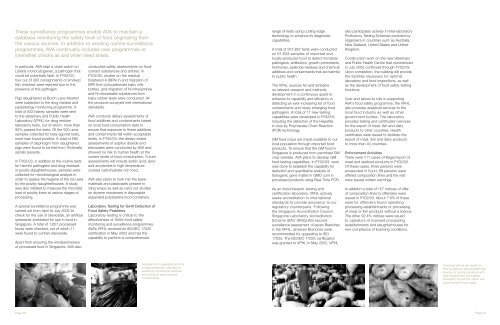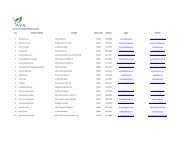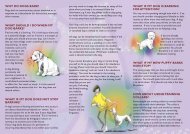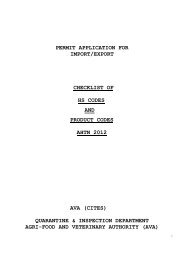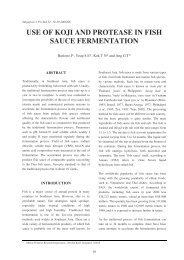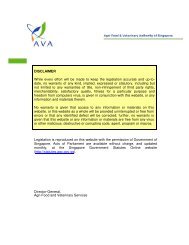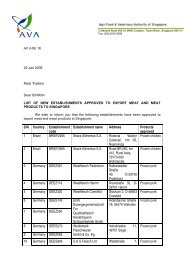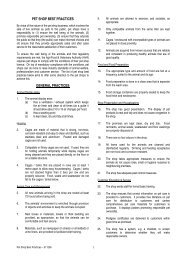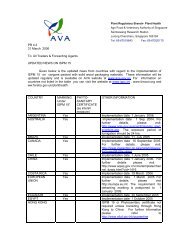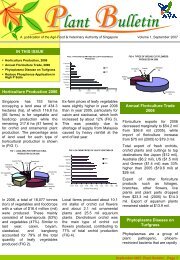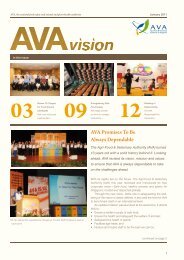2002/03 Annual report - Agri-Food & Veterinary Authority of Singapore
2002/03 Annual report - Agri-Food & Veterinary Authority of Singapore
2002/03 Annual report - Agri-Food & Veterinary Authority of Singapore
You also want an ePaper? Increase the reach of your titles
YUMPU automatically turns print PDFs into web optimized ePapers that Google loves.
These surveillance programmes enable AVA to maintain a<br />
database monitoring the safety level <strong>of</strong> food originating from<br />
the various sources. In addition to existing routine surveillance<br />
programmes, AVA continually includes new programmes or<br />
intensifies checks as and when need arises.<br />
In particular, AVA kept a close watch on<br />
Listeria monocytogenes, a pathogen that<br />
could be potentially fatal. In FY02/<strong>03</strong>,<br />
four out <strong>of</strong> 300 consignments <strong>of</strong> smoked<br />
fish checked were rejected due to the<br />
presence <strong>of</strong> this pathogen.<br />
Pigs slaughtered at Buroh Lane Abattoir<br />
were subjected to the drug residue and<br />
parasitology monitoring programme. A<br />
total <strong>of</strong> 832 kidney samples were sent<br />
to the <strong>Veterinary</strong> and Public Health<br />
Laboratory (VPHL) for drug residue<br />
laboratory tests, out <strong>of</strong> which, more than<br />
90% passed the tests. Of the 500 urine<br />
samples collected for beta-agonist tests,<br />
none was found positive. A total <strong>of</strong> 590<br />
samples <strong>of</strong> diaphragm from slaughtered<br />
pigs were found to be free from Trichinella<br />
spiralis parasite.<br />
In FY02/<strong>03</strong>, in addition to the routine tests<br />
for harmful pathogens and drug residues<br />
in poultry slaughterhouses, samples were<br />
collected for microbiological analysis in<br />
order to assess the hygiene <strong>of</strong> the ice used<br />
by the poultry slaughterhouses. A study<br />
was also initiated to measure the microbial<br />
load <strong>of</strong> poultry livers at various stages <strong>of</strong><br />
processing.<br />
A special surveillance programme was<br />
carried out from April to July <strong>2002</strong> to<br />
check for the use <strong>of</strong> stevioside, an artificial<br />
sweetener prohibited for use in food in<br />
<strong>Singapore</strong>. A total <strong>of</strong> 1,657 processed<br />
foods were checked, out <strong>of</strong> which 11<br />
were found to contain stevioside.<br />
Apart from ensuring the wholesomeness<br />
<strong>of</strong> processed food in <strong>Singapore</strong>, AVA also<br />
conducted safety assessments on foodcontact<br />
substances and articles. In<br />
FY02/<strong>03</strong>, studies on the residual<br />
bisphenol A (BPA) in and migration <strong>of</strong><br />
BPA from polycarbonate baby milk<br />
bottles, and migration <strong>of</strong> N-nitrosamines<br />
and N-nitrosatable substances from<br />
baby rubber teats were conducted. All<br />
the products surveyed met international<br />
standards.<br />
AVA conducts dietary assessments <strong>of</strong><br />
food additives and contaminants based<br />
on local food consumption data to<br />
ensure that exposure to these additives<br />
and contaminants fall within acceptable<br />
levels. In FY02/<strong>03</strong>, the dietary intake<br />
assessments <strong>of</strong> sulphur dioxide and<br />
benzoates were conducted by AVA and<br />
showed no risk to human health at the<br />
current levels <strong>of</strong> food consumption. Future<br />
assessments will include sorbic acid, lead<br />
and acrylamide in high temperature<br />
cooked carbohydrate-rich food.<br />
AVA also plans to look into the basematerials<br />
and plasticisers present in<br />
cling wraps as well as carry out studies<br />
on styrene monomers in disposable<br />
expanded polystyrene food containers.<br />
Laboratory Testing for Swift Detection <strong>of</strong><br />
<strong>Food</strong> Safety Problems<br />
Laboratory testing is critical to the<br />
effectiveness <strong>of</strong> AVA’s food safety<br />
monitoring and surveillance programmes.<br />
AVA’s VPHL received its ISO/IEC 17025<br />
certification in May <strong>2002</strong> and has the<br />
capability to perform a comprehensive<br />
Samples from vegetable and fruit<br />
consignments are collected for<br />
screening <strong>of</strong> pesticide residues<br />
and chemical and microbial<br />
contaminants.<br />
range <strong>of</strong> tests using cutting-edge<br />
technology to enhance its diagnostic<br />
capabilities.<br />
A total <strong>of</strong> 977,857 tests were conducted<br />
on 61,633 samples <strong>of</strong> imported and<br />
locally-produced food to detect microbial<br />
pathogens, antibiotics, growth promotants,<br />
hormones, pesticide residues and chemical<br />
additives and contaminants that are harmful<br />
to public health.<br />
The VPHL sources for and embarks<br />
on relevant research and methods<br />
development in a continuous quest to<br />
enhance its capability and efficiency in<br />
detecting an ever-increasing list <strong>of</strong> food<br />
contaminants and newly emerging food<br />
pathogens. A total <strong>of</strong> 17 new testing<br />
capabilities were developed in FY02/<strong>03</strong><br />
including the detection <strong>of</strong> the Hepatitis<br />
A virus by Polymerase Chain Reaction<br />
(PCR) technology.<br />
GM food crops are made available to our<br />
local population through imported food<br />
products. To ensure that the GM food in<br />
<strong>Singapore</strong> is produced from permitted GM<br />
crop varieties, AVA plans to develop GM<br />
food testing capabilities. In FY02/<strong>03</strong>, work<br />
was done to establish the capability for<br />
detection and quantitative analysis <strong>of</strong><br />
transgenic gene matter in GMO corn in<br />
processed products using Real-Time PCR.<br />
As an import/export testing and<br />
certification laboratory, VPHL actively<br />
seeks accreditation to international<br />
standards to provide assurance to our<br />
regulatory counterparts. Following<br />
the <strong>Singapore</strong> Accreditation Council<br />
<strong>Singapore</strong> Laboratory Accreditation<br />
Scheme (SAC-SINGLAS) second<br />
surveillance assessment <strong>of</strong> seven Branches<br />
in the VPHL, all seven Branches were<br />
recommended for upgrading to ISO<br />
17025. The ISO/IEC 17025 certification<br />
was granted to VPHL in May <strong>2002</strong>. VPHL<br />
also participates actively in inter-laboratory<br />
Pr<strong>of</strong>iciency Testing Schemes provided by<br />
organisers in countries such as Australia,<br />
New Zealand, United States and United<br />
Kingdom.<br />
Construction work on the new <strong>Veterinary</strong><br />
and Public Health Centre that commenced<br />
in July <strong>2002</strong> continued through FY02/<strong>03</strong>.<br />
Upon completion, the building will provide<br />
the facilities necessary for optimal<br />
laboratory and food inspections, as well<br />
as the development <strong>of</strong> food safety testing<br />
functions.<br />
Over and above its role in supporting<br />
AVA's food safety programme, the VPHL<br />
also provides analytical services to the<br />
local food industry as well as other<br />
government bodies. The laboratory<br />
provides testing and certification services<br />
for the export <strong>of</strong> meat, fish and dairy<br />
products to other countries. Health<br />
certificates were issued to facilitate the<br />
export <strong>of</strong> meat, fish and dairy products<br />
to more than 40 countries.<br />
Enforcement Activities<br />
There were 111 cases <strong>of</strong> illegal import <strong>of</strong><br />
meat and seafood products in FY02/<strong>03</strong>.<br />
Of these cases, three persons were<br />
prosecuted in Court, 69 persons were<br />
<strong>of</strong>fered composition fines and the rest<br />
were issued written warnings.<br />
In addition a total <strong>of</strong> 157 notices <strong>of</strong> <strong>of</strong>fer<br />
<strong>of</strong> composition fines to <strong>of</strong>fenders were<br />
issued in FY02/<strong>03</strong>. About 7.6% <strong>of</strong> these<br />
were for <strong>of</strong>fenders found operating<br />
processing establishments or processing<br />
<strong>of</strong> meat or fish products without a licence.<br />
The other 92.4% notices were issued<br />
to operators <strong>of</strong> licensed processing<br />
establishments and slaughterhouses for<br />
non-compliance <strong>of</strong> licensing conditions.<br />
Continual efforts are made by<br />
AVA to approve and accredit new<br />
sources <strong>of</strong> primary produce with<br />
high hygiene and food safety<br />
standards so that the nation will<br />
enjoy resilient food supply.<br />
Page 26 Page 27


